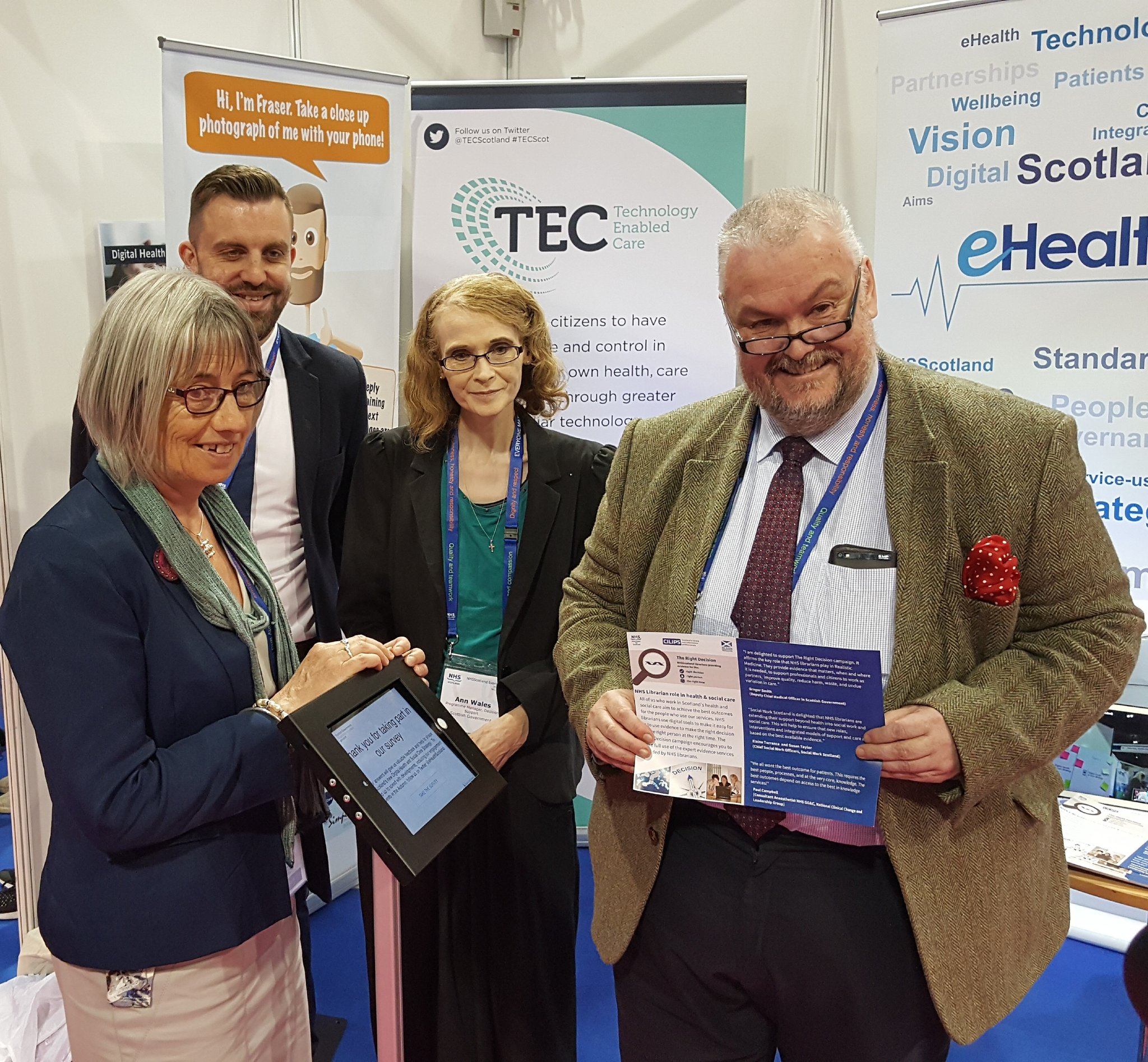How Librarians are Becoming Change Agents for Health and Social Care Transformation
Category: The Right Decision
The following is a guest blog by Dr. Ann Wales, Programme Manager, Decision Support for the eHealth (Digital Health and Care) Strategy and Policy Team within the Scottish Government

Annette Thain, Sean McNamara, Dr. Ann Wales and Paul Gray at campaign launch. Photo: @ehealthscotland
Health and social care in Scotland are changing at an unprecedented rate, in response to social and demographic change. Health and social care services have been integrated, managed by new entities. New models of care are being developed which emphasise prevention, self-management and use of community resources, and maximise the role of the primary care team.
These changes present both challenges and opportunities for NHS librarians. The Knowledge into Action Strategies for Health and Social Care, published in 2012, set out a direction of travel for NHS librarians to develop into knowledge broker roles, acting as intermediaries to support health and social care staff to use evidence to support frontline care and service development.
The Right Decision campaign now highlights how NHS librarians are innovating and transforming their roles to rise to deliver on this goal. The campaign was launched by Paul Gray, Chief Executive of NHS Scotland, on 20th June at the NHS Scotland national conference. It is a collaboration by CILIPS, NHS Education for Scotland, and the Scottish Government Digital Health and Care Team, to raise awareness of the NHS librarian role in providing evidence for decisions in health and social care.
NHS librarians have maximised their role in sourcing high quality evidence to support decisions about service redesign and social care, going beyond their traditional role in providing evidence for clinical decisions. They have recognised that long lists of research papers are often not practical for pressurised managers and practitioners. To make evidence easy to use in decision-making, NHS librarians are developing a uniquely valuable role in presenting the evidence as concise summaries.
NHS librarians have also established themselves as pioneers in using digital technology to access and use evidence. Not only do they collectively deliver The Knowledge Network as the national digital knowledge service for health and social care; in several Boards they are supporting development of decision support tools such as mobile apps; creating digital care pathways; and organising resources on local Intranets. As knowledge brokers, they also play a central role in building digital and information literacy skills to enable health and social care staff to make full use of these resources.
Further challenges lie ahead, given the urgency around the pressures on health and social care services. More needs to be done to strengthen librarian support in primary care, in the community, and in public health, as top priorities in the Health and Social Care Delivery Plan. Librarians have the opportunity to play a key role in helping staff in redesigned services to quickly access the knowledge they need for new and extended roles . And like other services now operating in the integrated environment, librarians need to make support for social care a core part of their activities.
A key way in which NHS librarians are rising to these ongoing challenges is through partnership and networking – with health and care teams and with partners in the library and information sector. This has always been essential to improve equity of support across NHS Scotland, where some areas have only one or two librarians to support a workforce of several thousand. Increasingly, librarians are working together to deliver services nationally. Examples include the Networked Evidence Search and Summary Service; and the unified digital library system used by all NHS Boards. During Self-Management Week – 2nd -6th October – NHS librarians will be working with public libraries, patient information centres, health promotion centres and The ALLIANCE – to raise awareness of how library and information services collectively support all as aspect of health and wellbeing, across all settings.
This librarian commitment to creativity and collaboration will continue to steer librarians through the uncharted territory of transformation in health and social care, and will help them to carve a new identity as catalysts for evidence-informed change.